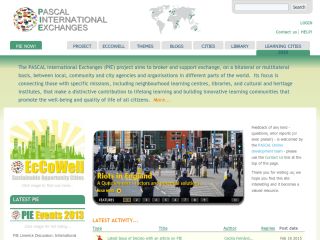OTB is mainly about short, sharp conversations between those who wish to extend the world's understanding of how improved life-long-learning can improve the way citizens and communities can flourish for themselves in this increasingly complex and uncertain world. Much conversation is in sound bites and it would be good if we could each hone our own so that they might make a real difference. We are starting off with three Themes, each portrayed as a Discussion Forum, with key Topics being developed through a conversation. Tell us whether this works for you, or if it doesn't can you think of a better way!!!
Outside the Box (OTB) – a new PASCAL Website facility
The PASCAL Advisory Council (PAC) is launching a new platform to facilitate an exchange of fresh views and experience on issues concerning PASCAL themes and concerns. This will be open to anyone to follow and to make contributions. PASCAL’s core concepts are Place and (Lifelong) Learning, as well as Social and economic matters, especially the concepts of human and social capital, work, employment and income, and old and new inequalities which originate from unequal access to learning and participation.
Learning cities, regions, communities and localities are central to this, and at the heart of the Pascal mission. OTB will try to visit them more ‘from outside’. Even in our field, where engagement with the wider world is central to what Pascal does, we risk getting into our own inward-looking community and talking our own ‘private’ language. Here we want to think Outside the Box in which we tend normally to think, assume things, and work.
The Council intends this policy initiative to serve as a democratic ‘Collective Public Forum’. The power of interactive media enables us all to think together about, discuss and advocate alternatives. With social media each citizen can be his or her own public author and contribute to making policy. But the value of this is only as good as the thinking and the dialogue – and as the knowledge and understanding behind it.
The difficulty is getting into a task which has virtually no boundaries: everything is connected with everything else. This is why we think, talk and conduct government so much in boxes. It is obvious that we need better governance: both locally and at the different higher levels, to deal with the big, chronic, usually global-local, problems that we share across the world as well as in our local communities and institutions.
Wide-ranging preparatory discussion among Council members has shown keen support for this initiative. It is welcomed also as bringing new and original material and views to the now well used Pascal Website. As to where to begin, both substantive subjects – public issues and problems - and the processes for managing change and governing better have support. Rather than make an arbitrary choice for one subject (like population movements, or global warming, or ageing, rising inequality, small enterprises and industrial innovation, the growth of mega-cities or health) we agreed to encourage several conversations to begin, and see where interest and intellectual productivity are strongest.
We expect that material of general interest will appear initially on the Pascal Website. Some may then take the form of press releases, pamphlets, advice to local-regional administrations, civil society organisations and universities, occasional papers or conventionally published books. Our purpose is to contribute to meaningful on-the-ground outcomes of benefit in communities and regions.
The shared guiding principle is that each area of discourse will be relevant to the present main focus of the Observatory: the values, purposes and ambitions contained in the terms learning city and learning region, and how they contribute to better outcomes for the planet and its inhabitants. This connection will be made evident during the maturing conversations.
Practically speaking, different members of Council and others closely associated with it are invited to lead and manage exchanges in an area of their choice and probably passion.
Three broad areas are proposed as the basis for a choice of early themes for OTB, with possible focal themes within each:
Development, learning, and the management of place (Hans Schuetze, Peter Welsh, Mike Osborne, Balazs Nemeth and others]:
- Decentralisation of national policy and practice to regional or local levels in unitary and federal nation states; the challenges of devolution
- The crisis of western democracy and leadership in a media and opinion-poll driven era; national impasse? local solutions?
Development and environment (Bruce Wilson, Steve Garlick, Pat Inman, Peter Welsh and others)
- Securing active civil society participation in achieving the new UN Sustainable Development Goals from 2015
- Eco-sustainability including a deeper ethical approach to the crises of global extinctions
- Food security, local production and sustainability
Development: Where from, where to? From experience and analysis to public discourse (James Powell, Larry Swanson, Henrik Zipsane, Chris Duke and others)
- Personal stories – narratives and analyses of what worked and did not work in ‘local’ change initiatives designed to create better understanding and stronger community
- What changes the narrative? – how to get new understandings to policy-makers and the wider public to alter the discourse and cause chang
These will not all begin together. Priority will depend on interest in pursuing an initiative; other focus themes have been suggested and may be added over time.
Chris Duke
Convenor, PASCAL Advisory Council
17 December 2014
 Printer-friendly version
Printer-friendly version- Chris Duke's blog
- Login to post comments
- 382 reads
Dear,
I was thinking of the same steps few months ago. This is a very good step. Critical thinkers know exactly what does it mean to think outsid ethe box. We were "prisoners" insdie a big box in IRAQ and now we hope that we can think outside THAT box.
Kind regards
Dr. Sherwan R Shal
Erbil
Kurdistan






